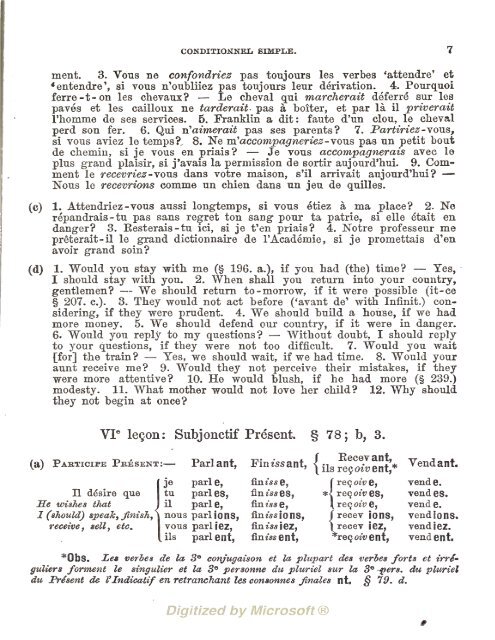comparative french-english studies, ninth edition - World eBook ...
comparative french-english studies, ninth edition - World eBook ...
comparative french-english studies, ninth edition - World eBook ...
Create successful ePaper yourself
Turn your PDF publications into a flip-book with our unique Google optimized e-Paper software.
(c)<br />
(d)<br />
CONDITIONNEL SIMPLE. 7<br />
ment. 3. Vous ne confondriez pas toujours les verbes 'attendre' et<br />
entendre', si vous n'oubliiez pas toujonrs leur derivation. 4. Pourquoi<br />
ferre-t-on les chevanx? Le cheval qui marcherait deferre sur les<br />
paves et les caillonx ne tarderait pas a boiter, et par la il priverait<br />
1'homme de ses services. 5. Franklin a dit: faute d'un clou, le cheval<br />
perd son fer. 6. Qui iCaimerait pas ses parents? 7. Partiriez -vous,<br />
si vous aviez le temps? 8. Ne itfaccompagneriez-vons pas un petit bout<br />
de chemin, si je vous en priais? Je vous accompagnerais avec le<br />
plus grand plaisir, si j'avais la permission de sortir aujourd'hui. 9. Comment<br />
le recevriez -vous dans votre maison, s'il arrivait aujourd'hui?<br />
Nous le recevrions comme un chien dans un jeu de quilles.<br />
1. Attendriez-vous aussi longtemps, si vous etiez a ma place? 2. Ne<br />
repandrais - tu pas sans regret ton sang pour ta patrie, si elle etait en<br />
danger? 3. Eesterais-tu ici, si je t'en priais? 4. Notre professeur me<br />
preterait-il le grand dictionnaire de 1'Academic, si je promettais d'en<br />
avoir grand soin?<br />
1. Would you stay with me ( 196. a.), if you had (the) time? Yes,<br />
I should stay with you. 2. When shall you return into your country,<br />
gentlemen? We should return to-morrow, if it were possible (it-ce<br />
207. c.). 3. They would not act before ('avant de' with Infinit.) considering,<br />
if they were prudent. 4. We should build a house, if we had<br />
more money. 5. We should defend our country, if it were in danger.<br />
6. Would you reply to my questions? Without doubt, I should reply<br />
to your questions, if they were not too difficult. 7. Would you wait<br />
[for] the train? Yes, we should wait, if we had time. 8. Would your<br />
aunt receive me? 9. Would they not perceive their mistakes, if they<br />
were more attentive? 10. He would blush, if he had more ( 239.)<br />
modesty. 11. What mother would not love her child? 12. Why should<br />
they not begin at once?<br />
VP legon: Subjonctif Present. 78; b, 3.<br />
(a) PARTICIPE PRESENT: Parl ant, Fhmsant,<br />
II desire que<br />
He wishes that<br />
tu<br />
parl e,<br />
parl 68,<br />
1 (should) speakj finish, \ nous parlions,<br />
receive, sell, etc. I vous parliez,<br />
[ ils parl ent,<br />
finesses,<br />
finesse,<br />
fin ess ions,<br />
fin ess ent,<br />
f Eecevant,<br />
\ilsre9owent,*<br />
f re9 oiv 6,<br />
frecev ions,<br />
recev iez,<br />
Vend ant.<br />
vende.<br />
vend 68.<br />
vend e.<br />
vend ions.<br />
vend iez.<br />
vend ent.<br />
*0bs. Lea verbes de la 3 conjugaison et la plupart des verbes forts et irrguliers<br />
forment le singulier et la 3e personne du pluriel sur la 3e -$ers. du plwiel<br />
du Present de VIndicatif en retranchant les consonnes finales nt. 79. d.
















